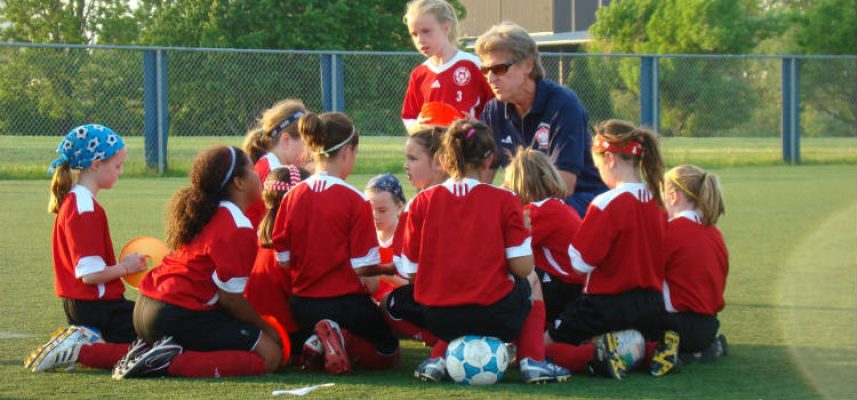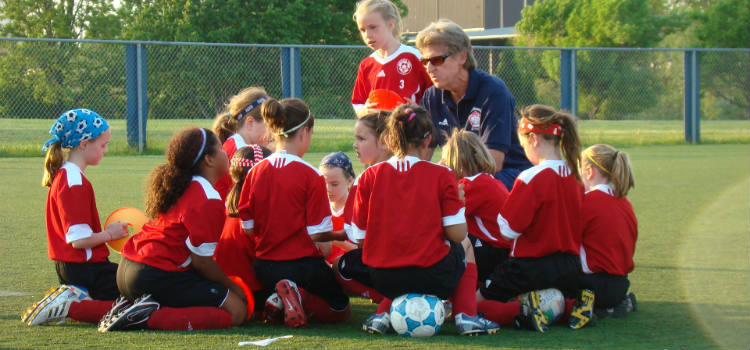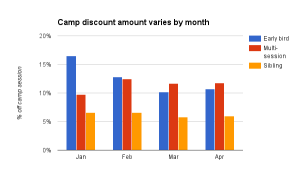What should you shout from the sidelines during your kids soccer games? Here’s what the coaches really think — and other tips they wish parents knew.
By Katherine Teel
The Wests know whereof they speak: They’ve been on both sides of the field — as both coaches and soccer parents. For the past 15 years, they’ve coached co-ed recreational soccer teams ranging in age from 4 to 16. And two of their daughters are soccer players: Their middle child was skilled enough to receive college scholarship offers. And their petite, dimpled 11-year-old daughter tears up the field like a beast as part of the Wests’ current team. To be sure, these coach/parents have carefully considered what they think works best, one look at their team records over the years supports their theories.
Ready for a little coaching of your own? Take a deep breath, and read on to see if it might be time to rethink a few of the things you’re doing at your child’s practices and games.
Find a list of soccer classes, clinics & camps near you >>
1. Sometimes it’s Good to Stick Your Nose (or Foot) in
It’s hard for parents to know how involved to be with their kids. If you sit and watch every practice, you might be helicoptering, but if you leave you might be abandoning them. “We like to have parents there,” says Ruth Ann, “because when the parents stay, they have opportunities to engage with the kids during practice.” For instance, when the team is one person short, a parent can sub in during a two-person drill or participate in a scrimmage as a player or referee.
Lew also likes the parents to see all of the effort the players put into practice time. “Kids these days work incredibly hard at the things they care about,” he says, “and I like for parents to see that.”
2. Yell All You Want … But You’re Not the Coach
“We love when the parents are positive and cheer from the sidelines,” Ruth Ann says. Her coaching style reflects that enthusiasm — she’s loud and laughs a lot, and every shout is a yell of of encouragement. “Definitely,” agrees Lew. “But there’s a difference between yelling encouragement and coaching from the stands. Sometimes parents contradict what the coaches are telling the players.” Other types of parent participation the Wests could do without: Criticizing the ref, yelling negatives (“Who were you passing to!?”), and working themselves up over a bad call. In general, if you feel your blood starting to boil, it’s probably time to take a lap — or a deep breath.
3. The Kids Can’t Hear You Anyway …
Just ask your child, if you don’t believe it: The reality is that most of the time, those players can’t hear you — no matter what you shout. They are running fast, breathing hard, and battling over an ever-moving orb. The last thing they have time for is to stop and listen to parental advice.
4. But the Other Adults Sure Can!
“The worst part about rude or aggressive shouting is that it ruins the game for the other families,” Ruth Ann cautions. “Your child probably doesn’t know what you said, but the parents you have to sit near at next week’s game certainly do.” Also keep this in mind: Some of those parents may be recording the game on video (and audio) — including your shouts and conversations. Make sure what you say is worthy of being preserved for posterity. This is a kids soccer game, after all.
5. A Good Soccer Coach Isn’t Necessarily Out to Win
As soccer parents, the Wests have dealt with their share of other coaches, which has helped inform their approach today. “A good coach takes a group of kids and helps them become a team,” Ruth Ann says. They do this, she explains, by helping children create a work ethic that includes hard work and team building, and at the same time, they make the experience fun.
“The difference between a good coach and a bad one is the focus that coach has,” Lew adds. “By focus, I mean, is their only goal to win, or to teach the love of the game and teamwork?” At heart, we all know that developing young minds is more important than winning. It’s a wonderful fringe benefit of being involved in a team sport.
6. How Do Your Kids Soccer Games Measure Up?
Whether you’re interested in getting your child started in soccer — or just finding a team that’s a better fit — ActivityHero can help. If you don’t love your coach’s style or the emotions it brings out in you and your child, don’t be afraid to take a look at what else is out there. And if your child is looking for a great team sport to try, there’s no time like the present.
Find a list of Soccer Classes, Clinics & Camps near you >>
Get more parent tips for kids at blog.activityhero.com.



















